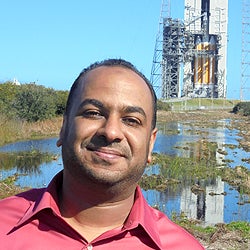Ahmed Fadl has a big mission at NASA—and a critical role in ensuring public safety during risky rocket launch operations. He recently garnered one of NASA’s highest awards for spotting a potentially catastrophic defect on the Antares rocket launch pad.
Loaded with more than 500,000 pounds of volatile propellant, the Antares carries payloads to the International Space Station. Fadl, who works in NASA’s Wallops flight safety office in Virginia, reviewed the design and saw a troubling workmanship flaw in the system that holds the rocket upright before launch. NASA officials ordered corrective action and Fadl’s supervisors then nominated him for the Space Flight Awareness Honoree Award bestowed in December 2014.
“You really feel the impact of your work, especially when your work is related to safety because it’s extremely critical and highly valued,” Fadl says.
Fadl and his colleagues spend months scrutinizing space rockets and their flight trajectories to determine potential hazards and calculate risks. Engineers draw up contingency plans and consider how a failure would impact people on the ground, in ships and even in planes.
To analyze all the scenarios and trade-offs, Fadl says it’s crucial to consider different perspectives, something he learned in URI’s International Engineering Program dual doctoral program. It doesn’t hurt that he speaks three languages—English, German and Arabic— and holds a deep understanding of multiple cultures. “In the dual degree program, you realize you should not jump to a conclusion right away and you have to look at things from different perspectives,” he says. “You will not realize that in a classroom. You will realize that by living the experience.”

